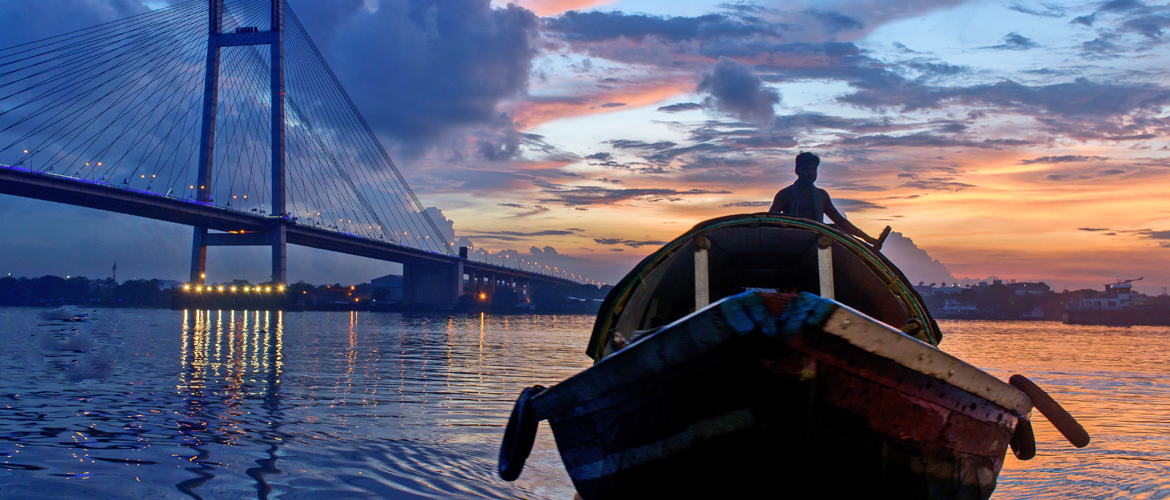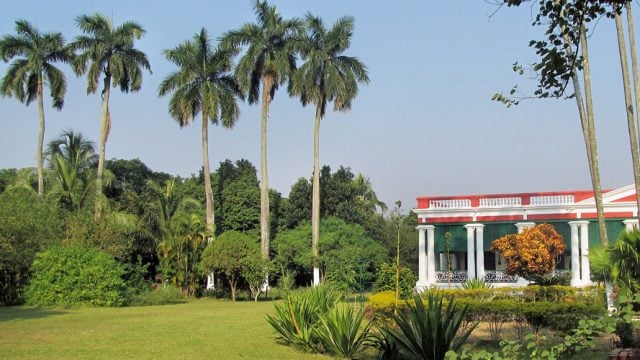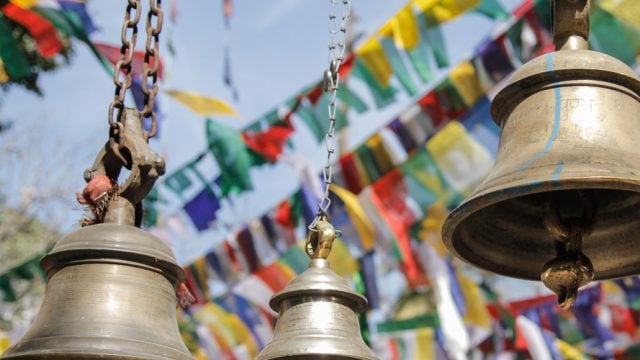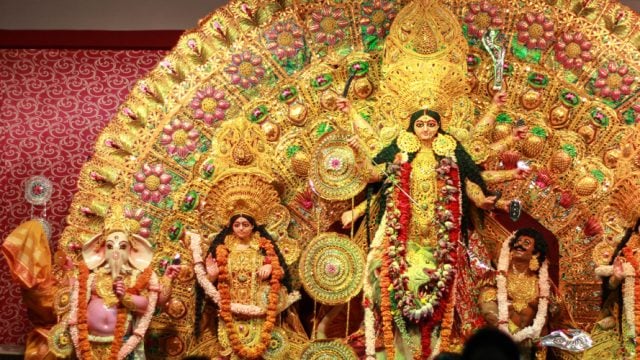One of Kolkata’s oldest thoroughfares, the Strand Road, stretches between Princep Ghat and the city-end of the
The thick walls of the building offered a respite from the morning heat no sooner than I entered the Heritage Centre, our first stop on ‘A Voyage through Tide and Time’, a special tour organised by the Port Trust in collaboration with Regional Directorate, India Tourism, Kolkata. The halls still sported some of the old balcony windows with their wooden slats. The walls were covered with informative panels; display cases of original artefacts and replicas of lighthouses, ships, etc. were neatly arranged with enough space to move in between.

Although the Calcutta Port Trust (as it was known until the city changed its name) played an important role in the development of shipping and trade in India, its contribution has remained largely unknown to the general public. But now you can know about it by visiting the Heritage Centre where wall displays talk about the history of Kolkata, the Hooghly river system, the establishment of the docks, the people powering the Port Trust, the various landmark events connected with the port or its administration, important social incidents, including the damage to life and property during the two World Wars, etc. Even the chapter of indentured labour travelling from India to the foreign shores is well documented. There was also a room full of old maps, made available to researchers with special permissions.
Among the serious documentations, we came across some interesting trivia. A copy of a deposit money receipt – dated August 19, 1947 – made out in the name of one Arun Kumar Chatterjee who had joined the Port Commissioner’s office as a cashier. A person who would later turn out to be one of Indian cinema’s greatest actors and Bengal’s superstar, Uttam Kumar. There was a measuring tape that had a key role to play in the construction of what was then (1943) the third longest cantilever bridge in the world. Today, we know it as the Howrah Bridge (Rabindra Setu). The steel precision tape was made in England in 1936 in a manner that it would see negligible length variation with temperature change. The construction of the Howrah Bridge began from the two anchor spans at two ends and advanced towards the centre, which necessitated zero error matching under Calcutta weather, which this tape ensured.
From the Heritage Centre, we boarded a bus to reach the historic Man of War jetty on the Hooghly river bank, a short hop away. Waiting for us at the quay was the gleaming white Sealand. From the plush air-conditioned confines of the boat, we observed the city side of both Kolkata and Howrah. Historic ghats, warehouses and skeletons of once flourishing factories, old homesteads, old signage, etc, loomed on either side. We sailed beneath the Howrah Bridge. We just about caught a glimpse of the Putul Bari (Doll House), a statuette or two visible beyond a clump of trees. The brick-red Howrah Station shone bright in the morning light. Ferry boats loaded with passengers criss-crossed the river. As we admired the river view, Gautam Chakraborti, security adviser to the Port Trust and a keen heritage enthusiast and his colleagues apprised us of the history of Kolkata Port and the various landmarks that we saw. We sailed a little beyond Ahiritola Ghat from where the boat turned around and travelled downstream.
The downstream was more interesting. The Kolkata (Calcutta) Port is the only riverine port of India with a 232 km long navigational channel, one of the longest in the world. We crossed underneath the Vidyasagar Setu. While to our left, on the Kolkata-side, appeared old warehouses and a few interesting landmarks, to our right was the Botanical Gardens, more old ghats, including one with a huge statue of Shiva smiling benignly at the passing boats. Listening to details of how ships entering Kolkata port are piloted through the treacherous channels, we sailed up to the point from where the ships are guided into the docks. Unfortunately, a slight delay prevented us from seeing a ship entering the docks. We caught a glimpse of the Suriname Memorial from the boat. A replica of the Mai Baap Memorial in Paramaribo (capital of Suriname in South America), it is a tribute to the Indian contract workers who were whisked away to the foreign shores as migrant labourers between 1873 and 1916.
“Ranging from the Howrah Bridge through the Man of War Jetty to the Indenture Memorial, the Port is like an open history book,” said Chakraborti, as we dropped anchor at the Indenture Memorial, formally known as the Kolkata Memorial, our last port of call on this ‘Voyage through Time and Tide’.
The Kolkata Memorial, built under the aegis of Global Organization of People of Indian Origin (GOPIO), was inaugurated on January 11, 2011—at the Khidderpore Depot located on Garden Reach Road along the Hooghly River—”in recognition and remembrance of Indian Indentured Labourers of 19th – 20th centuries”.
The inscription on the plaques states:
“From here they set forth ..
This memorial commemorates the thousands of indentured Indian laborers who sailed from
Kolkata Port between 1834 and 1920 to lands far away seeking better livelihoods for themselves
and their families.
This is a celebration of their pioneering spirit, endurance, determination and resilience.
They made significant contributions to their adopted countries, yet cherished and passed on the
spirit of Indianness – culture, values, traditions – to their descendants.
We salute them.”
We walked past the Memorial to arrive in front of a Clock Tower, which was erected in 1899 by the Commissioners of the Port of Calcutta—at the site of its first Dock office—to help ships in transit set their time. The tower was designed by W. Banks Gwyther and constructed by Martin & Company. The four-faced turret clock was set up by Cooke and Kelvey. The clock, which had stopped working for nearly 30 years, was thoroughly repaired by Kolkata’s popular TR Clock Co, and recommissioned on March 4, 2013.
Walking past largely abandoned work areas and offices of the depot, which seemed like a ghost town in falling light, we returned to the bus for our journey back to the heart of the city.

Information: The Voyage Through Tide and Time is a special tour organised by the Kolkata Port Trust to acquaint travellers with the legacy surrounding the organisation and the city. Since some of the attractions are in restricted areas, such as the Kolkata Memorial, the trip is a hassle-free opportunity to see them. Kolkata Port Trust has decided to hold land cum river tours (subject to a minimum number of people) on select days. The first trip is on April 8, 2018, starting at 3.30pm. Subsequent trips will be held on Fridays. The group shall be taken in an air-conditioned bus from the Heritage Centre to the Port’s Man of War Jetty and then for a two-hour boat ride, sailing past the 150 year old Port’s major watermarks and dropped back at Princep Ghat or Fairley Place (snacks/tea/soft drinks shall be served on board). Ticket prices (all inclusive) have been pegged at ₹1,399 for Indian, Nepalese, and Bhutanese nationals, and ₹2,499 for other foreign nationals.
Since a part of the tour is through restricted areas, at the time of booking, domestic travellers have to submit their PAN number while foreigners have to submit details of passport.
For booking and other information, contact: Reception Counter (Ground Floor), Kolkata Port Trust Headquarters , 15 Strand Road, Kolkata 700001 or Office of The Security Adviser , Kolkata Port Trust , Port Security Organisation (24×7), P-65 Circular Garden Reach Road, Kolkata 700043. Email: [email protected].
Kolkata
Kolkata Port Trust Maritime Archives and Heritage Centre
Uttara Gangopadhyay





